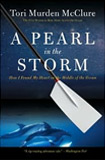Summary | Excerpt | Reading Guide | Reviews | Beyond the Book | Readalikes | Genres & Themes | Author Bio

How I Found My Heart in the Middle of the Ocean
by Tori Murden McClure
When I returned to rowing, I noticed a sport fishing boat alter
course and head out toward me. A few minutes later, the boat came
alongside. Two middle-aged men sat with beers in hand; one asked,
"Are you the woman who’s trying to row across the Atlantic?"
"Yes," I answered, pulling hard, trying to place some distance
between our vessels.
"We just came over to tell you that you’re completely nuts."
As they zoomed off, leaving me in a cloud of engine exhaust, I
considered the merits of their claim. That morning, a radio interviewer
had thrust a microphone into my face and peppered me with
one obnoxious question after another. He opened with "Why?"
This is one of my least favorite questions. If someone approves of
what you do, he will not ask you why you do it; no one says, "Doctor,
why do you want to cure cancer?" With the question "why" comes a
subtle accusation that one is doing something wrong. "Why" is not a
simple question, and I couldn’t produce a simple answer, only simple
evasions. The best evasion ever uttered came from George Leigh
Mallory when he was asked, "Why do you want to climb Everest?"
He answered, "Because it’s there."
Beginning my evasions, I responded to the interviewer with
questions of my own: "Why does an acorn strive to become an oak?"
"Why does a caterpillar lock itself into a cocoon before it becomes a
butterfly?"
Either missing the point or choosing to ignore it, my inquisitor
followed with a different question: "Why row a boat across the
Atlantic when you can sail?"
"Why sail when you can fly?" was my return.
My inquisitor talked about the deprivation and the pain that I
was letting myself in for. "Why do it?"
It was easy to see that this man prided himself on his intelligence.
Sharing this fault, I looked him in the eye and answered, "The pathway
to enlightenment is through the room with a thousand demons."
A look of surprise skidded across the interviewer’s face. His eyes
widened, and for an instant he seemed to understand that my journey
was not about rowing a boat from point A to point B. My goals were
as intellectual as they were physical, and for one precious moment
that interviewer seemed to understand.
Through solitude and exposure to uncertainty, I believed I would
confront my demons. Beyond this confrontation, I expected to find
a doorway to some higher intellectual awareness. Had I known the
true nature of the demons I would duel, I never would have had the
audacity to go looking for them. It was my first day; I was still blissful
in my ignorance.
As the sun began to set, I watched seagulls and terns head back
toward shore. A band of red splashed up from the western horizon,
and streaks of orange, yellow, and purple striped the sky above. As the
sunset faded, the light from the 156-foot tower of the Bodie Island
Lighthouse served as the last reminder of civilization. I wanted to
row until the curve of the ocean rose to extinguish this light, but I
lost my duel with the lighthouse for the unglamorous reason that I
was hungry.
Cheese enchilada ranchero was the first freeze-dried dinner in
the stack of meals under the rowing deck. Ocean rowers, like high altitude
mountaineers, need to consume between 4,000 and 5,000
calories a day to avoid losing muscle mass. Typically, this is about two
pounds of food per day, but because I packed freeze-dried dinners,
I was able to reduce the weight to about 150 pounds of food for the
one hundred days.
Not only does freeze-dried food provide high caloric value at a
minimum weight, but the packaging also "swims" well. No one had
ever rowed across the North Atlantic without capsizing. My deck
hatches were weathertight, but experience taught me that this did
not mean waterproof. If the boat flipped upside down, water would
get into my food compartments. Before the trip, I tested various food
packages by running them through my washing machine. As I’ve
said, freeze-dried food swims well; Hershey’s chocolate does not.
Excerpted from A Pearl in the Storm by Tori Murden McClure. Copyright © 2009 by Tori Murden McClure. Excerpted by permission of Collins, a division of HarperCollins, Inc. All rights reserved. No part of this excerpt may be reproduced or reprinted without permission in writing from the publisher.
Your guide toexceptional books
BookBrowse seeks out and recommends the best in contemporary fiction and nonfiction—books that not only engage and entertain but also deepen our understanding of ourselves and the world around us.